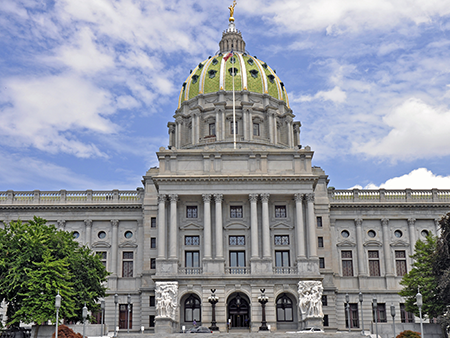MEDIA CONTACT:
Bill Zeiders, Pennsylvania Farm Bureau
717-731-3541 | Email
For Immediate Release: June 29, 2021
 Spending Plan Maintains Funding for Key Agriculture Programs, Addresses Two Important Tax Issues, but Falls Short on Broadband, Conservation
Spending Plan Maintains Funding for Key Agriculture Programs, Addresses Two Important Tax Issues, but Falls Short on Broadband, Conservation
CAMP HILL, Pa. – Pennsylvania Farm Bureau (PFB) is pleased that the 2021-2022 state budget will maintain funding for programs important to Pennsylvania farmers, and address two important tax issues, but believes additional investments are needed to strengthen the state’s number one industry and grow rural communities throughout the commonwealth.
As part of the overall budget, the General Assembly adopted two important tax provisions for farmers. The first will allow farmers to defer their income from crop insurance payments on their state income taxes for one year. Crop insurance payments count as income and are triggered when there has been a significant loss due to poor weather. The federal government gives farmers the ability to defer that income for a year, but that was never offered at the state level. This change in tax policy will give farmers flexibility to manage their budgets. The second change clarifies how farmers can qualify for sales tax exemptions on the purchase of all-terrain vehicles (ATVs) that are used for the performance of farm chores. Department of Revenue regulations occasionally subjected to farmers to needless audits to determine whether those vehicles were being used for farming purposes.
However, PFB is disappointed that the spending plan does not include additional funding to expand broadband internet access in rural communities or to assist with implementation of on-farm practices to protect water quality. The budget does include a 5 percent increase for the Pennsylvania Department of Agriculture’s general government operations and would maintain level funding for the Penn State Cooperative Extension, the University of Pennsylvania School of Veterinary Medicine and the Pennsylvania Agricultural Surplus System, which assists in getting excess food from Pennsylvania farms and food processors into the charitable food network. The budget also maintains funding for agriculture programs that had been zeroed out in the proposed budget Gov. Tom Wolf outlined in February.
PFB President Rick Ebert offered the following comments:
“While we are pleased that this budget maintains funding for many programs that support Pennsylvania agriculture, now is not the time to settle for the status quo. After years of a challenging farm economy followed by a crippling pandemic, investment is needed to help family farms and rural communities thrive. Agriculture is the Keystone State’s number one industry, powers the economies of our rural communities, and improves quality of life throughout the commonwealth by maintaining open space and providing access to fresh, local food. An investment in our family farms is an investment in all Pennsylvanians.
“Broadband access remains one of the greatest challenges facing rural businesses and residents. The COVID-19 pandemic laid bare the digital divide that makes growing our rural communities a challenge. High-speed internet is no longer a luxury, it’s a necessity for business, healthcare access, education, and daily life. Farmers need broadband access to take advantage of the latest technology to help us farm smarter, more efficiently and with a smaller environmental footprint.
“In addition, greater public investment is needed to share in the cost of farm conservation efforts, especially in high-priority areas like the Chesapeake Bay Watershed. Farmers are already conservation leaders and want to do even more, but we operate on slim margins and cannot afford these expenses on our own. Pennsylvania’s plan to meet its goals for reducing nutrient and sediment pollution in the Chesapeake Bay by 2025 leans heavily on implementing on-farm conservation measures. But significant gaps remain in funding and technical support needed to achieve those goals.
“We believe additional investments, particularly in broadband infrastructure, can strengthen rural communities, and help secure the future of the state’s number one industry. We look forward to working with lawmakers in the months ahead to address these issues.”
-30-
Pennsylvania Farm Bureau is the state’s largest farm organization, representing farms of every size and commodity across Pennsylvania.
